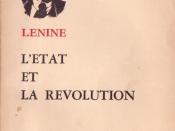To say that ?Marx?s strong emphasis on structure over agency led both Marx himself and other Marxists to favor violent revolution and the hierarchical organization of the working class? is very limiting to the entire political theory which makes up Marxism and communism. Although realizing the potency of the structure which suppressed the proletariat, Marx realized the interplay and relationships between agency and structure rather than emphasizing one as significantly more imperative than the other. Revolution was often suggested by Marx and later Marxists, but each individual philosopher felt differently about the interplay betwixt structure and agency and how it pertained to revolution?s role in the onset of communist society, and none made a point of structure being ?over? agency.
Marx?s works commonly express the idea that communism is the next social development, capitalism being a catalyst to the uprising of the masses to make this change. Such belief suggests that agency would be used to change the structure to the direction it was already headed toward, as ?not criticism but revolution is the driving force of history? (Marx ?The Materialist Concept of History?, 11), indicating that agency?s intermittent upheavals and restructuring of the structure is necessary, and that structure isn?t an entity which supercedes agency, rather it is a mold which different agencies change throughout the evolution of society.
Marx?s beliefs were a ?question of revolutionizing the existing world, of practically attacking and changing existing things? (Marx ?The Materialist Concept of History?, 12). Revolution brought about by a disgruntled agency to catalyze the fall of a fruit which was structure from the social-evolutionary tree.
Marx?s arguments also strongly suggest a battle between two agencies rather than a war between agencies against a near impenetrable structure. Marx believed that ?circumstances make men just as much as men make circumstances? (Marx...


